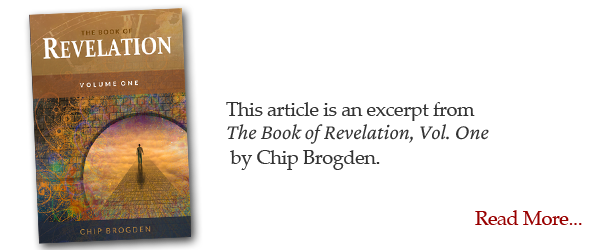Even though I’m going to share with you the four primary interpretations, I’m really oversimplifying it just so that I’m not overcomplicating it. I don’t want you to get lost into too much detail here, because for every interpretation of the Book of Revelation, there are fifty or sixty different ways to say that something means something, and no one really agrees. I think it’s best not to go too deep into it because that will only confuse you. But I think it will help you to look at the major areas of interpretation, the major ways that people have approached the Book of Revelation and then we can look at the fifth way. But before we do that, let’s talk about three simple steps to correctly understand the Bible.
(1) TRANSLATION
What did God say? What did God say? Actually, this is going to be three simple steps for any kind of communication. As a writer, I know what I write, and I know what I mean, and I know how I wish it to be applied. But people take my words out of context all the time. They misquote me. They attribute words to me that I never wrote, things that I never said. The very first step of any communication, and Scripture in particular, is the accurate translation. What did God say? Or in the case of the Bible, what exactly does the Bible say?
I remember that as a child I became interested in the Book of Revelation, when I was probably eight or nine years old, because some kid in my Sunday school class said that in the Book of Revelation there’s a verse that says, “The eagle and the bear will wage war, and the bear will defeat the eagle and rule over the earth.” His interpretation of this verse was that Russia would defeat the United States in World War III and we would all die under the Russians. This was at the height of the Cold War. I don’t know where he got his information from, but that motivated me to read the Book of Revelation at age eight or nine, whatever the time was, and look for that verse! I wanted to find that verse about the eagle and the bear waging war and the bear conquering the eagle. I thought that was pretty critical to my understanding of life!
You know what happened. I read through the Book of Revelation and not a single verse had anything to do with an eagle and a bear fighting. You may think, “Wow, that’s really strange!” But you know, people today do the exact same thing. They assume that the Bible says something. They assume that the Book of Revelation says something. They build teachings and doctrines around things that Scripture doesn’t say.
The first thing we need to do is know exactly what it says – and that’s translation. Translation is giving an accurate account of what it says. I believe the Bible is inspired and it is perfect in its original languages; but the challenge with translation is you have to get it from the original translation into a different translation, and so there’s going to be some question of opinion about what the original language said or what it meant. That doesn’t cast any doubt in my mind about the accuracy of Scripture, but it does (in my view) open up some modern translations to question. When translators bring their own personal theology and their own biases into a translation, then it’s really important that we understand what Scripture actually says.
As a beginning at least, you could look it up and know it, so you won’t be like I was when someone quotes something supposedly from the Bible. You won’t go into a panic or become stressed out. But you know the word of God. You’ve hidden the word of God in your heart. You know what it says. You know what it doesn’t say. That’s the first step to accurately understanding the Bible.
(2) INTERPRETATION
What did God mean? Once we know what God says, then interpretation is a question of what does that mean? Once we know for sure what we’re dealing with (what does it say?) – next, what does it mean? It’s just like when I write something in a book, or in an article, or a blog post, or an email. Here’s what I said; Now what does it mean? What does he mean when he says that? What does God mean when He says the things that He says? What did John mean when he wrote the things that he wrote in the Book of Revelation?
There are certain rules and methods of interpretation that you follow to try and accurately understand and determine what the correct interpretation is. Sometimes there’s more than one way to interpret something and that’s where the confusion can sometimes come in. I’ve had people say to me often, “Well, that’s just your opinion.” Let me say it like this: Some opinions are better than others. Some interpretations of Scripture are more solid and more accurate than other interpretations of Scripture. We can’t just write it off as saying, “Well, that’s your opinion. Everyone’s entitled to their opinion. You have your truth and I have my truth.” No! There’s only one truth, and we want to do the best that we can to interpret that one truth in the light of things such as the context, the setting, how and if it is confirmed by other Scripture. There are several ways that we go about trying to get at the correct interpretation.
I realize, in the age that we live in, everyone has an opinion; everyone thinks that they are right, and everyone believes they are entitled to their version of truth. But the fact of the matter is: One plus one equals two! Your truth may say that one plus one equals three, but that’s not truth; that’s error. When we don’t know for sure then we say we don’t know for sure. But we try to make the best attempt that we can to rightly divide the word of God.
Translation – What did God say? Interpretation – What did God mean? Here’s the other thing that people stumble over and that is…
(3) APPLICATION
How does it apply to me? How does it apply to you? When it was written, did it apply to the people it was written to, or does it have some application to us? Is it something that we are supposed to imitate and do exactly the way they did, or is it a lesson maybe in the opposite – to not do what they did?
That’s where translation, interpretation and application all work together. I think there’s probably many passages in the word of God where we see what God said, we understand what God meant, but what God said and what God meant only applied to the people to whom He was speaking to. You run into this issue with people who want to go back under the Old Covenant, live under the Hebrew laws, and put themselves under the yoke of bondage to Judaism – because they believe they are going back to their “Hebrew roots.” Well, the fact of the matter is, you may accurately translate what God said, and you may accurately interpret what God meant, but that does not necessarily follow that it applies to you.
Now that does open us up to some ambiguity, because some people would like to be able to say that nothing applies to them if it convicts them of their sin or challenges their lifestyle or their preferences. They would like to say, “I just don’t believe that applies to me!” But once again, we’re not free to simply disregard something out of hand just because we don’t like what it says. Instead, we have to rightly divide the word of God, using translation, interpretation and application, to see how does it apply to me? Unless we’ve got a really good reason, we should always look for a way for it to apply to us either directly, or at least indirectly, in some kind of a lesson or some kind of a sign.
As an example, Paul said that the things that the Hebrews went through in the wilderness were written down and were preserved as examples for us so we would not behave the way they did. In that case the application is a reverse application. It’s not that we’re supposed to be like they were. It is intended to teach us the lesson not to behave as they behaved; but to be obedient, and to follow the Lord, and to not be unbelieving, and not want to go back to Egypt. In that case the application is not to imitate them but to be the opposite of what they were.
“How do you determine that, brother Chip?” Well, you determine it by accurately reading, translating, interpreting, and applying what Scripture says; and I believe you have to interpret the Scripture with the Holy Spirit. It’s inspired by the Spirit. It’s empowered by the Spirit. It’s written by inspiration of the Spirit. And it requires (as we learned last time) spiritual people to interpret spiritual things spiritually. The natural man, it says, cannot receive the things of the Spirit of God, neither can he know them, because they are spiritually discerned. Most people (at the risk of sounding arrogant again to some people) don’t know how to translate, interpret or apply Scripture because they’re not spiritual. They’re carnal. They’re fleshly. They rely on their theological degrees and their education instead of relying on the quickening Spirit, the life-giving Spirit, the mind of Christ, to rightly translate, interpret and apply the Scriptures.
Three simple steps – Translation, Interpretation and Application. If we wanted to graphically illustrate it, we could illustrate it this way: translation leads to interpretation, which leads to application. We should always be looking for how we can apply these things. In Revelation 1:3 it says: “Blessed is he who reads and those who hear the words of this prophecy and keep those things which are written in it; for the time is near.” “Blessed are those who keep those things.” There’s the application; and particularly when we get to Revelation 2 and 3 and we look at the seven letters to the Seven Ekklesias, we’re going to see ample opportunity for application here.
I want to impress that upon you. If it is only a theological exercise to you, if it’s only satisfying your curiosity, but you never apply what you are learning and you never take it to heart and put it into practice, then you’re not going to derive the full benefit, the full blessing to be found, in the Book of Revelation – or in the Bible as a whole. Jesus says it is the ones who hear My words and do them -apply them to their lives, put them into practice – they are the ones who are like the man who built his house on the rock; but it’s the ones who hear and don’t put into practice that are building their houses on the sand.
That’s going to be really, really important as we get into this study of the Book of Revelation. I can’t express to you how important it’s going to be for your spiritual life as we get into the real meaning and the real message here in the Book of Revelation. I haven’t heard anyone talking about it. I feel like I have to talk about it, point it out, sound the alarm here, so that we are not only translating and interpreting Revelation, but we are applying it. We are putting it into practice insofar as we are able to.
Three Things to Watch Out For
If translation, interpretation and application are the three easy steps to correctly understanding the Bible, then there are three things that we have to watch out for; and it’s going to be the three things that people stumble over as they attempt to translate, interpret and apply Scripture.
(1) MISQUOTING
The first one having to do with translation I’ve already mentioned, misquoting Scripture. If you’re misquoting Scripture, if you’re adding to it, subtracting from it, or you’re only quoting something partially, or you’re taking something out of context, then you’re not going to have an accurate translation. If you don’t have an accurate translation, then you certainly cannot have an accurate interpretation.
That’s why I’m taking so much time here in the beginning. You know, a lot of people jump right into the Book of Revelation chapter 1 and they want to start teaching. That’s the way I have done it for years; but now, with a little more wisdom and experience, I realize that we can’t just jump into the Book of Revelation. That would be like throwing people into the deep end of the pool.
Instead, we have to lay a foundation. We have to understand the purpose of the Book. We have to understand the different ways that the Book can be interpreted. Then we’re going to have to look at the structure, how the Book is revealed, how it is laid out, the table of contents if you will, the big picture, so that you don’t just get lost in some meandering journey and wonder where you are and wonder where everything is leading up to. You know, before you take a trip it’s nice to look at a map and kind of see the beginning and the end and the things in the middle so that when you’re actually on the journey, you can gauge where you are in the process and check where you are with the big picture, with the map, and say, “O.K., I’m one-third of the way through, I’m halfway through, I’m three-quarters of the way through, I’m almost at the final destination.” I think if you’re going to do that with any book in the Bible, Revelation is definitely the place where you want to do it.
The things to watch out for with translation: if you misquote, add, subtract, or take something out of context, you’re obviously not going to arrive at the correct meaning.
(2) MISINTERPRETATION
The second has to do with interpretation. Misinterpretation means you’ve come to the wrong conclusion even if you’ve got the translation correct. Even if you know exactly what Scripture says, it’s possible that you could just misinterpret the whole thing and come to the wrong conclusion.
I could go on for days talking about how people have taken Scripture and twisted it, come to some wrong conclusions, and hurt themselves and hurt other people because of the wrong conclusions that they have come to – all because they don’t follow good, basic principles of interpretation.
(3) MISAPPLICATION
The third thing to watch out for is in the area of application, and its misapplication. That’s the example I gave you about – you’ve got the accurate Scripture for what God said in the Old Covenant. You have the accurate interpretation of what it meant – to the Jews, at least. But then you apply it the wrong way by trying to put Christians, believers in Jesus, under this yoke of Judaism in the name of “Hebrew roots.” It’s a problem that Paul addressed in the Book of Galatians. “Who has bewitched you, that you would turn away from the truth and go after fables?” This is not a new thing but it’s an example of how you can take the right translation and take the right interpretation but completely get the wrong idea about how to apply it.













